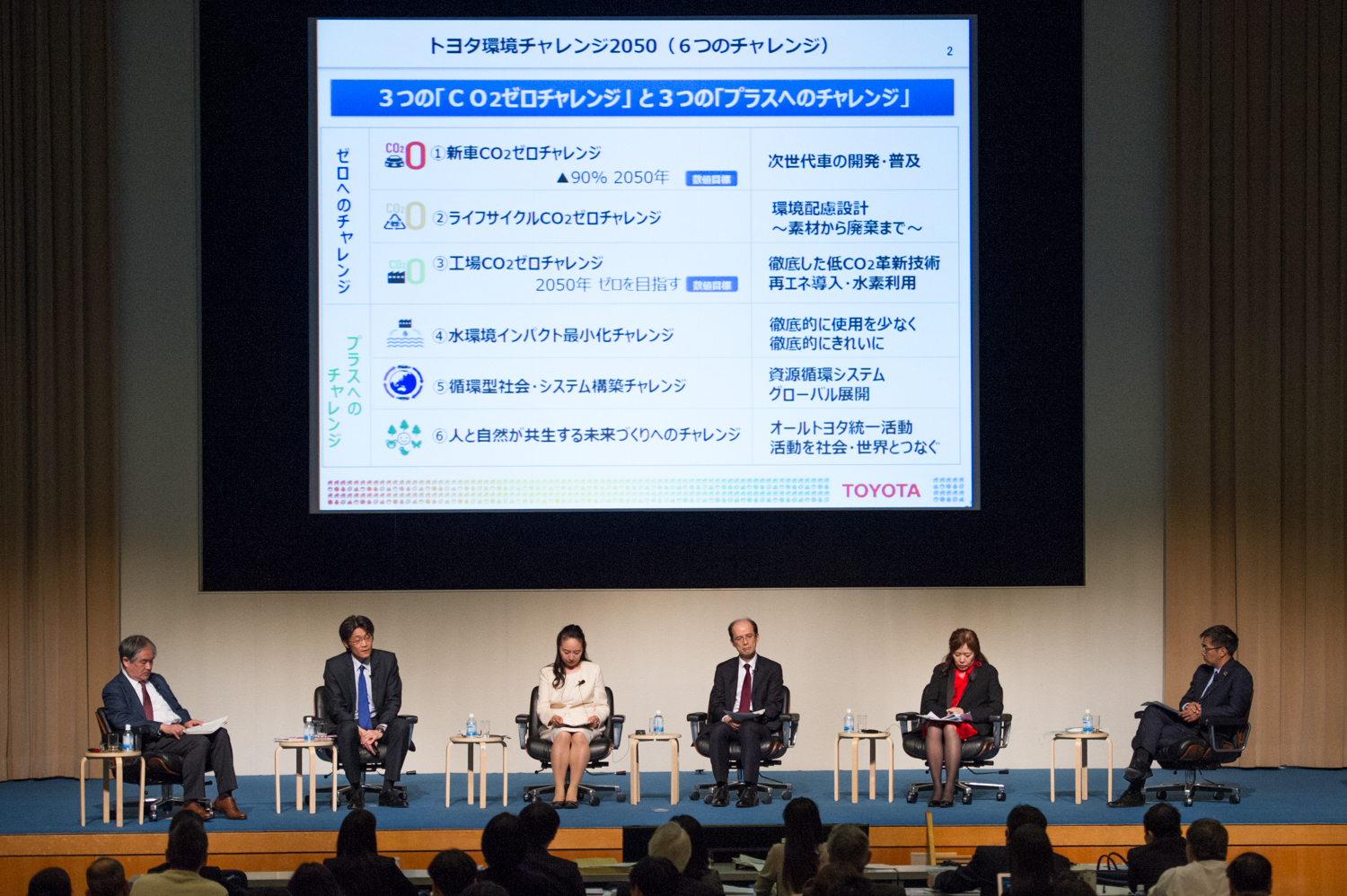2017-07-13

UNU-IASは4月20日、SDGダイアログ・シリーズの一環として「グローバル企業と2030アジェンダ」を開催しました。本イベントは、昨今の社会情勢の大きな変化を踏まえ、「持続可能な開発目標(SDGs)」が指し示す社会のあるべき姿に照らした、新しい企業経営の在り方について議論しました。
浜中裕徳SDSN Japan議長・地球環境戦略研究機関理事長の開会あいさつと趣旨説明に続き、沖大幹国連大学上級副学長・東京大学教授、有馬利男グローバル・コンパクト・ネットワーク・ジャパン代表理事・富士ゼロックス株式会社エグゼクティブ・アドバイザー、そしてフルヴィオ・グアルネリ ユニリーバ・ジャパン・カスタマー・マーケティング株式会社プレジデント&CEOによる基調講演が行われました。
沖上級副学長は、企業にとってSDGsはさらなる成長の機会になることの具体例を示しつつ、義務ではなく権利として、また社会貢献や慈善事業といったコスト(費用)ではなくビジネス投資として捉えた企業が、今後、競争上有利になり得るとし、企業の取り組みのモニタリングやベンチマーキングの必要性について示唆しました。
有馬氏は、企業経営の視点からSDGsをいかに捉えるべきかについて、経営フローとCSR、企業をプッシュする世界の動きおよびCSR経営の進化の点から、具体的な事例を交えて紹介しました。グアルネリ氏は、多くの製品を通じて世界中にインパクトを与えている企業責任を踏まえ、持続可能性を事業の中核と位置付け、他社との差別化を図る同社の取り組みを説明し、他の企業・機関と連携した今後の展開に言及して講演を締めくくりました。
滝順一日本経済新聞社編集委員がモデレーターを務めるパネル・ディスカッションでは、企業経営におけるSDGsの重要性、投資の観点から見たSDGs、そして日本企業の課題に関して議論が行われました。饗場崇夫トヨタ自動車株式会社環境部担当部長は、2050年に向けた野心的な数値目標に基づく取り組み事例を、山本百合子イオン株式会社秘書部シニアマネジャーは、お客さま第一を企業文化として実践する自社の活動を、世界で展開する植樹活動等の事例とともに紹介しました。議論の中で、両社ともSDGsという共通の言語・指標を用いることで国・地域・関係会社を超えて認識を共有することができるとの指摘がありました。
髙橋則広年金積立金管理運用独立行政法人(GPIF)理事長は、年金積立金の運用にあたり、長期の安定したリターンを実現するツールの一つとして、環境・社会・企業統治に配慮した企業に対する「ESG投資」に取り組んでいくと述べるとともに、非財務情報の情報開示の重要性を指摘しました。また、森澤充世CDP事務局ジャパンディレクターからは、責任投資原則(PRI)に関する世界の潮流について、説明がありました。蟹江憲史UNU-IASシニアリサーチフェロー・慶応義塾大学教授は、SDGsは経済の課題であり、経営戦略上のツールとして活用することの重要性を指摘しました。また聴衆からの質問を受け、慶応義塾大学の学生たちが実施した「キャンパスSDGs」について紹介しました。
本イベントのプログラムおよび講演資料は、「こちら」からダウンロードできます。
本イベントは、持続可能な開発ソリューション・ネットワーク(SDSN Japan)との共催により、また、日本経済新聞社、グローバル・コンパクト・ネットワーク・ジャパン、CDPの後援、地球環境パートナーシッププラザ(GEOC)の協力のもとで行われました。
2017-07-13

On 20 April 2017, UNU-IAS and the Sustainable Development Solutions Network Japan (SDSN Japan), with the support of Nikkei Inc., the Global Compact Network Japan, and CDP, organized an event on Global Companies and the 2030 Agenda as part of its SDG Dialogue series. Bringing researchers and representatives of multinational corporations together, the dialogue examined how companies can contribute to mainstreaming the Sustainable Development Goals (SDGs). Specifically, speakers and participants discussed two key questions: integrating social and environmental agendas into corporate management beyond a corporate social responsibility (CSR) perspective and linking environmental, social, and governance (ESG) investment criteria to the 2030 Agenda for Sustainable Development.
In the first of three keynote speeches, Taikan Oki (Senior Vice-Rector, UNU; Professor, University of Tokyo) urged companies to become trailblazers in integrating the SDGs into their long-term core business. He pointed out that the actions of global companies are increasingly monitored by investors and consumers, to their detriment if they fail to properly respond to the global agenda. Toshio Arima (Chairman of the Board, Global Compact Network, Japan; Executive Advisor, Fuji Xerox Co. Ltd.) highlighted the need to mainstream CSR into corporate management and core business operations. He also suggested using corporate resources to help advance solutions to issues affecting customers and society. Fulvio Guarneri (President & CEO, Unilever Japan Customer Marketing K.K.) discussed how Unilever, with its operations in 190 countries, has been making a difference in promoting the health and wellbeing of 2.5 billion people worldwide, reducing environmental impacts, and enhancing livelihoods. He noted that, setting sustainable living as its core mission, the company aims to mobilize collective actions for achieving the global goals.
The panel discussion that followed, moderated by Junichi Taki (Senior Writer, Nikkei Inc.), extended the dialogue by considering the importance of the SDGs in corporate management and investors’ views on ESG investment. Panelists representing some global companies highlighted their practices and ideas for embracing the 2030 Agenda. Takao Aiba (Project General Manager, Environmental Affairs Division, Toyota Motor Corporation) introduced six challenges which Toyota as a company aspires to address by 2050 in order to go beyond zero environmental impact and achieve a net positive impact. As Senior Manager, Secretary Division of AEON Co., Ltd., Yuriko Yamamoto indicated the SDG-related initiatives her company has undertaken by planting over 11 million Forest Stewardship Council (FSC)-certified trees, and empowering women through leadership positions. Norihiro Takahashi (President, Government Pension Investment Fund (GPIF)) revealed that GPIF considers ESG factors as a tool for maximizing long-term, stable returns on its investments.
The panelists also identified obstacles. Given that the SDGs include 17 goals and 169 targets, it may be difficult for a company with operations in many countries, and multiple suppliers and business partners, to juggle all the goals, thus requiring prioritization based on its areas of focus. There is also varied and limited understanding among companies about what benefits SDGs can offer to expand their businesses and satisfy investors. Michiyo Morisawa (Japan Director, CDP) and Norichika Kanie (Senior Research Fellow, UNU-IAS; Professor, Keio University) enriched the discussion by assessing the recent business environment and stressing the benefits for companies to work on the SDGs in the context of the principles of responsible investment (PRI) and evaluation of corporate performance. Responding to a question posed by a participant, Kanie highlighted an initiative for raising awareness of the SDGs in Japan in collaboration with companies and university students.
The event programme and presentation materials can be found HERE. (linked to website of UNU-IAS)